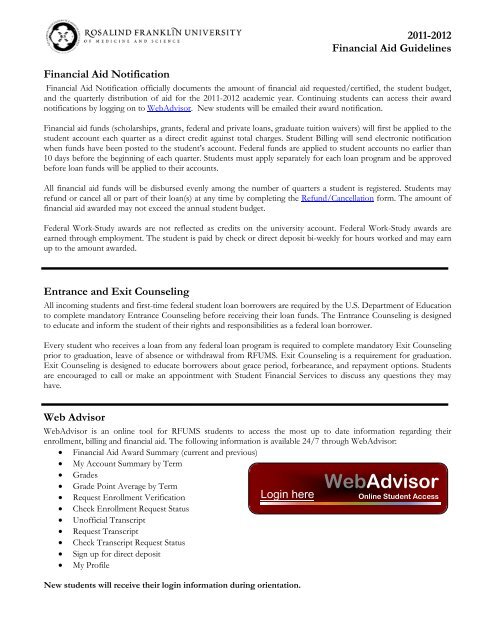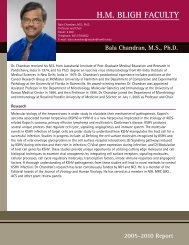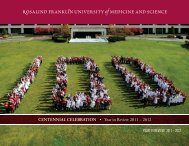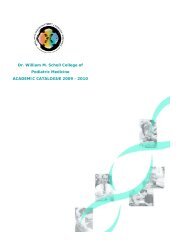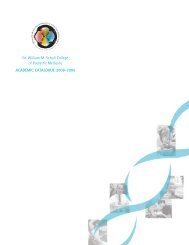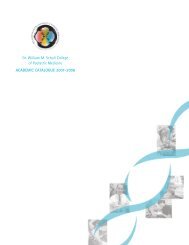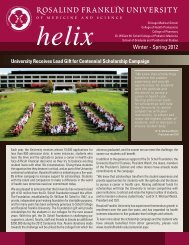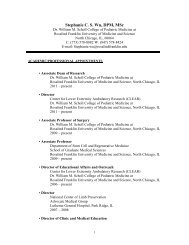WebAdvisor - Rosalind Franklin University
WebAdvisor - Rosalind Franklin University
WebAdvisor - Rosalind Franklin University
Create successful ePaper yourself
Turn your PDF publications into a flip-book with our unique Google optimized e-Paper software.
2011-2012<br />
Financial Aid Guidelines<br />
Financial Aid Notification<br />
Financial Aid Notification officially documents the amount of financial aid requested/certified, the student budget,<br />
and the quarterly distribution of aid for the 2011-2012 academic year. Continuing students can access their award<br />
notifications by logging on to <strong>WebAdvisor</strong>. New students will be emailed their award notification.<br />
Financial aid funds (scholarships, grants, federal and private loans, graduate tuition waivers) will first be applied to the<br />
student account each quarter as a direct credit against total charges. Student Billing will send electronic notification<br />
when funds have been posted to the student’s account. Federal funds are applied to student accounts no earlier than<br />
10 days before the beginning of each quarter. Students must apply separately for each loan program and be approved<br />
before loan funds will be applied to their accounts.<br />
All financial aid funds will be disbursed evenly among the number of quarters a student is registered. Students may<br />
refund or cancel all or part of their loan(s) at any time by completing the Refund/Cancellation form. The amount of<br />
financial aid awarded may not exceed the annual student budget.<br />
Federal Work-Study awards are not reflected as credits on the university account. Federal Work-Study awards are<br />
earned through employment. The student is paid by check or direct deposit bi-weekly for hours worked and may earn<br />
up to the amount awarded.<br />
Entrance and Exit Counseling<br />
All incoming students and first-time federal student loan borrowers are required by the U.S. Department of Education<br />
to complete mandatory Entrance Counseling before receiving their loan funds. The Entrance Counseling is designed<br />
to educate and inform the student of their rights and responsibilities as a federal loan borrower.<br />
Every student who receives a loan from any federal loan program is required to complete mandatory Exit Counseling<br />
prior to graduation, leave of absence or withdrawal from RFUMS. Exit Counseling is a requirement for graduation.<br />
Exit Counseling is designed to educate borrowers about grace period, forbearance, and repayment options. Students<br />
are encouraged to call or make an appointment with Student Financial Services to discuss any questions they may<br />
have.<br />
Web Advisor<br />
<strong>WebAdvisor</strong> is an online tool for RFUMS students to access the most up to date information regarding their<br />
enrollment, billing and financial aid. The following information is available 24/7 through <strong>WebAdvisor</strong>:<br />
• Financial Aid Award Summary (current and previous)<br />
• My Account Summary by Term<br />
• Grades<br />
• Grade Point Average by Term<br />
• Request Enrollment Verification<br />
• Check Enrollment Request Status<br />
• Unofficial Transcript<br />
• Request Transcript<br />
• Check Transcript Request Status<br />
• Sign up for direct deposit<br />
• My Profile<br />
Login here<br />
New students will receive their login information during orientation.<br />
<strong>WebAdvisor</strong><br />
Online Student Access
2011-2012<br />
Financial Aid Guidelines<br />
Tuition and Fee Payment<br />
<strong>Rosalind</strong> <strong>Franklin</strong> <strong>University</strong> of Medicine and Science require timely payment of all tuition and fees. Billing<br />
statements for active student accounts will be mailed to the address on file with the Registrar’s Office three (3) weeks<br />
prior to the quarter start date. Failure to receive an official <strong>University</strong> billing statement does not relieve any student of<br />
the responsibility for payment. Tuition and fees are billed quarterly and due on or before the first day of each term.<br />
Billing statements will include charges and anticipated financial assistance as of the statement date. Remember: A<br />
statement is a snapshot of a student account on the day it was generated. Payments or other credits received will not<br />
show up until the next bill is generated. Students may also access Web Advisor to view the most up-to-date balance.<br />
Registration is made final only upon satisfaction of all charges.<br />
Important Payment Dates<br />
Term Statement Financial Aid<br />
Release Date Disbursement<br />
Summer May 31, 2011 – April 29, 2011 May 31, 2011 –<br />
2011 August 5, 2011<br />
June 4, 2011<br />
Fall August 15, 2011 – July 15, 2011 August 15, 2011 –<br />
2011 November 4, 2011<br />
August 20, 2011<br />
Winter November 14, 2011 October 14, 2011 November 14, 2011 –<br />
2011 – February 17, 2012<br />
November 19, 2011<br />
Spring February 29, 2012 – January 27, 2012 February 27, 2012 –<br />
2011 May 18, 2012<br />
March 2, 2012<br />
*Statement Release Date: Student billing statements mailed.<br />
Tuition/Fee Late Charges<br />
Due Date Assessed<br />
May 31, 2011 June 6, 2011<br />
August 15, 2011 August 23, 2011<br />
November 14,<br />
2011<br />
February 27,<br />
2012<br />
November 22,<br />
2011<br />
March 6, 2012<br />
Making Payments<br />
Students can pay by mail, drop box, or in person. Tuition and fee charges may be paid by the following options<br />
below:<br />
• Payment in full using check or money order (include Colleague ID)<br />
Mail to: Student Financial Services<br />
Bursar Office<br />
3333 Green Bay Road<br />
North Chicago, IL 60064<br />
To ensure proper credit of student account, your check should be:<br />
o Payable in U.S. dollars to RFUMS<br />
o Include your name and student ID<br />
Your check will be deposited upon receipt<br />
• Financial Aid Deferral<br />
Students who have financial aid pending by the quarter start date may use this option. Students must have<br />
taken all required steps to receive the financial aid. Tentative financial aid or awards in process cannot be used<br />
in determining the net balance due on a student’s account. Students choosing to apply for financial aid option<br />
should contact Student Financial Services prior to the quarter start date. Loan funds not received within 60<br />
days will be reviewed.<br />
• Sponsored Third Party Billing<br />
RFUMS will temporarily defer the payment of students who present written authorization/contract from a<br />
third party/sponsoring company for payment of tuition and/or fees on their organization or corporate<br />
letterhead. All letters/contracts are subject to review by Student Financial Services and must include the<br />
following information:<br />
• Student’s name<br />
• Student ID
2011-2012<br />
Financial Aid Guidelines<br />
• Quarter or academic year covered<br />
• Dollar or percentage limit (tuition and/or fees), if applicable<br />
• Sponsoring organization’s name, billing address, contact person and telephone number<br />
Sponsored Third Party documentation must be submitted to Student Financial Services 30 days prior to the quarter start date.<br />
• Credit Cards<br />
Student Financial Services accepts credit card payments for tuition and the student service fee; however, the<br />
following requirements do apply:<br />
• MasterCard, Visa, Discover and American Express are accepted by phone or fax<br />
• All financial aid funds must be applied to the balance first before using a credit card for payment<br />
• Credit card payments will not be accepted on accounts already paid in full unless the student<br />
provides written authorization to hold the pre-payment for future quarters in which the student owes<br />
an outstanding balance after applying financial aid funds<br />
• Convenience fee of 2.50% will be charged for all credit card payments<br />
Late Payment and Service Charge<br />
Effective May 1, 2011, students with outstanding balances will be assessed a quarterly late fee of $50.00 and<br />
interest on any unpaid balance. An interest fee calculated on a daily basis at the rate of 18% per annum<br />
(1.5% per month) calculated back to the first day of the academic term will be assessed to the student’s<br />
account. A <strong>University</strong> hold will also be placed on a student’s account until the balance is paid in full. If<br />
further action is warranted, the student will be responsible for all collection costs and legal fees.<br />
<strong>University</strong> Hold<br />
Students and former students who have an outstanding balance with RFUMS are subject to being placed on a<br />
<strong>University</strong> hold. A <strong>University</strong> hold could result in any or all of the following:<br />
• Denial of registration for courses and access to D2L<br />
• Withhold transcripts or diploma<br />
• Suspension of all <strong>University</strong> services and privileges<br />
• Administratively withdraw the student<br />
• Assign the student's account to a collection agency<br />
• Report the delinquent account to a credit bureau<br />
• Cancellation of health, dental and vision insurance<br />
Returned Checks<br />
If a check payment posted to your account is returned by the bank because of insufficient funds, the returned check<br />
along with a $25.00 returned check fee will be charged to your student account. Failure to immediately replace the<br />
returned check will result in a <strong>University</strong> hold being placed on your student account.<br />
Health Insurance<br />
<strong>Rosalind</strong> <strong>Franklin</strong> <strong>University</strong> requires that all full-time students obtain and maintain health insurance while enrolled at<br />
RFUMS. In order to ensure that all students are in compliance with this requirement, the <strong>University</strong> offers group<br />
health insurance provided by Maksin Management Corp.
2011-2012<br />
Financial Aid Guidelines<br />
New students must submit either a Health Insurance Enrollment Form or a Health Insurance Waiver Form by the<br />
10 th business day of the first academic term enrolled at the <strong>University</strong>. The health insurance waiver must be<br />
accompanied by proof of coverage from another insurance company. Students who fail to return either of the<br />
required forms will automatically be enrolled in the Maksin Plan B.<br />
Loan Program Review<br />
HPSL<br />
(Podiatry<br />
only)<br />
Monash,<br />
MSLT<br />
(Medical<br />
only)<br />
Loan Program Perkins<br />
Subsidized<br />
Stafford Unsubsidized Stafford Grad PLUS<br />
Apply FAFSA FAFSA FAFSA<br />
FAFSA,<br />
RFUMS<br />
App, MPN<br />
FAFSA, RFUMS App,<br />
MPN<br />
FAFSA,<br />
RFUMS App,<br />
MPN<br />
Interest Rate<br />
5% fixed;<br />
subsidized<br />
5% fixed;<br />
subsidized<br />
6%<br />
6.8% fixed;<br />
subsidized<br />
6.8% fixed; unsubsidized<br />
7.9% fixed;<br />
unsubsidized<br />
Fees N/A N/A N/A Up to 1% Up to 2% Up to 4%<br />
Annual Max Varies Varies Varies $8,500<br />
$12,000 graduate students<br />
$32,000 professional<br />
1st & 2nd year students<br />
$38,666 professional<br />
3rd & 4th year students<br />
Up to cost of<br />
attendance less<br />
other financial<br />
aid funds<br />
Annual Min $500 $500 $500 $500 $500 $500<br />
6 months – loans<br />
disbursed after<br />
July 1, 2008<br />
Grace Period 9 months 12 months 12 months 6 months 6 months<br />
No Grace –<br />
loans disbursed<br />
prior to July 1,<br />
2008<br />
National Student Loan Data System (NSLDS)<br />
NSLDS will give you access to your federal loan information 24/7. We encourage all students to utilize this valuable<br />
online tool. Log on to www.nslds.ed.gov to review your federal loan information at any time.<br />
Deferment of Loans from Previous Institutions<br />
To claim deferment on student loans obtained as an undergraduate or as a graduate student, a properly certified<br />
deferment must be submitted to the lender/servicer. The form is available from the lender. Timely filing of the<br />
deferment form is important, as it must be done before the expiration of any grace period. Deferment provisions on<br />
the different loan programs vary. Deferment forms are certified by Academic Records and Retention. RFUMS<br />
participates in the National Student Clearinghouse. Reminder: update your address with all previous<br />
lenders/servicers.<br />
Student Overpayments<br />
Student loan funds are received by the Finance Office before the start of each quarter. Any billing on a student’s<br />
account (tuition, fees, health insurance, and housing) is automatically paid by the received loan funds. Any credit<br />
balance remaining on the student’s account will be processed as an “overpayment” to the student. The student<br />
overpayment is used to cover books, supplies and living expenses. It is the student’s responsibility to budget<br />
accordingly. Advances and short-term loans are not permitted.
2011-2012<br />
Financial Aid Guidelines<br />
Students who have a credit balance on their account will receive an automatic payment via direct deposit to the<br />
student's personal bank account or via a check mailed to the student's local address. Payments are processed every<br />
Wednesday and Friday.<br />
If students have not previously set up direct deposit and would like to have funds deposited directly to their personal<br />
bank account in the future, log on to Web Advisor to do so.<br />
If a student does NOT want to have payment sent automatically via direct deposit or check, please complete an<br />
Authorization to Hold Funds Form and return to the Student Financial Services, Student Billing<br />
It is recommended that new students relying on financial aid for their living expenses bring enough money with them<br />
to cover at least two months worth of rent and expenses. Refund checks are normally available within two weeks of<br />
the start of classes.<br />
2010-2011 Student Overpayment Dates:<br />
Quarter Dates Overpayment Release Dates<br />
Summer 05/31/2011 – 08/05/2011 Week of 05/31/2011<br />
Fall 08/15/2011 – 11/04/2011 Week of 08/15/2011<br />
Winter 11/14/2011 – 02/17/2012 Week of 11/14/2011<br />
Spring 02/27/2012 – 05/18/2012 Week of 02/27/2012<br />
Budget Planning<br />
Use the Budget Worksheet to help in planning your budget for the year. If you requested the full student budget, you<br />
are allotted approximately $1700 per month for living expenses. Remember to account for loan fees which will reduce<br />
the amount of funds you receive. Student overpayments include the funds allocated for books, supplies, living<br />
expenses and boards.<br />
Direct Deposit<br />
RFUMS recommends that your student payment to be electronically deposited into your personal bank account. If you<br />
do not sign up for direct deposit, a check will automatically be mailed to the billing address on file. Visit the Student<br />
Financial Services Student Billing website for the Direct Deposit Authorization form and details on how to enroll.<br />
Current students may sign up on <strong>WebAdvisor</strong>.<br />
Requesting Additional Loan Funds<br />
Students who did not initially request their full Stafford Loan or Grad PLUS eligibility may request additional loan<br />
funds in writing by completing the Additional Loan Request form and returning it to Student Financial Services.<br />
Additional loans can be processed for students once they have a valid Master Promissory Note (MPN) on file for the<br />
Federal Stafford Loans, or the Grad PLUS Loan.<br />
Refund and Cancellation Form<br />
Use the Refund/Cancellation form to cancel loans you do not require before disbursement and to refund loan funds<br />
to the bank after disbursement. Submit completed form and payment (if applicable) to Student Financial Services.
2011-2012<br />
Financial Aid Guidelines<br />
Budget Appeals<br />
Budget adjustments are available in very limited circumstances, such as daycare expenses or unexpected medical<br />
expenses not covered by health insurance. Students requesting increases in the standard student budget due to<br />
exceptional circumstances are required make an appointment with Student Financial Services. You will be required to<br />
complete a separate application and provide extensive documentation of all relevant expenses. Your request may be<br />
reviewed by a committee.<br />
Federal regulations allow us to consider only those expenses that are directly related to your attendance at RFUMS for<br />
the academic year in question. The regulations do not allow us to take into consideration any payments to consumer<br />
debt (credit cards) or automobile loans when determining a student's cost of attendance or the student's eligibility for<br />
federal or institutional funds.<br />
Award Adjustments<br />
Federal program regulations require an adjustment of a financial aid award containing any federal funds if a student's<br />
award from all sources is in excess of the calculated demonstrated need. RFUMS reserves the right to reduce its award<br />
if necessary. If a RFUMS award is reduced, the policy is to adjust the award so as to leave the student with the most<br />
favorable fund sources whenever possible. The school also reserves the option of substituting other program funds,<br />
should budget allocations necessitate such conversion.<br />
If a student receives a scholarship from a private source, they are required to notify Student Financial Services as soon<br />
as possible. If the student has unmet need, the scholarship will simply be added to the existing award. If the student's<br />
need is met, their award will be re-adjusted.<br />
Obligation to Repay Loans<br />
Signing a promissory note represents your agreement to the terms of that loan and to repay the loan when it comes<br />
due. Copies of loan applications should be kept by the borrower with a copy of the promissory note detailing the<br />
terms and conditions of the loan. Delays in repayment or defaults jeopardize our future ability to fund students.<br />
Satisfactory Academic Progress<br />
In accordance with Federal regulations, students must meet the criteria for Satisfactory Academic Progress to be<br />
eligible for financial aid. Regulations require a maximum time frame for degree completion, a quantitative<br />
measurement (such as credit hours earned towards degree), and a qualitative measurement (such as cumulative grade<br />
point average or acceptable pass/fail status). The criteria for academic progress and objectives are determined by each<br />
academic program and students should consult the appropriate student handbook for requirements.<br />
Each college has an associated governing body which defines and monitors academic progress and objectives in<br />
conjunction with Academic Records and Retention.<br />
Refund Policy<br />
Official withdrawal from a course or from the university entitles a student to a tuition refund according to the<br />
schedule below. No other fees are refundable. Official paperwork (withdrawal/leave of absence form) must be fully<br />
completed and submitted to Academic and Retention Services by Friday at 4:30 p.m. CT to be considered valid for<br />
that week's tuition refund.<br />
Week 1 100%<br />
Week 2 75%
Week 3 50%<br />
Week 4 25%<br />
Week 5 0%<br />
2011-2012<br />
Financial Aid Guidelines<br />
The refund will be credited to the student's account (less any amount still owed for other charges), direct deposited, or<br />
a check will be mailed once all holds are removed from their account. Students on a Leave of Absence will need to<br />
request a check if they do not want the credit to be applied to the returning term.<br />
Return of Federal Title IV Funds<br />
A student may find it necessary to withdraw from school or enter a leave of absence during a quarter. When this<br />
occurs, the student may owe a refund of Title IV funds. It is important that every student at <strong>Rosalind</strong> <strong>Franklin</strong><br />
<strong>University</strong> of Medicine and Science (RFUMS) is familiar with the Title IV refund policies.<br />
In general, the law assumes that the student must “earn” federal financial aid awards directly in proportion to the<br />
number of days of the term attended. In other words, a student earns financial assistance as they attend class. If a<br />
student completely withdraws from all classes during a term, the <strong>University</strong> must calculate the portion of the total<br />
scheduled financial assistance earned. If the student received (or <strong>University</strong> received on behalf of the student) more<br />
assistance than earned, the unearned excess funds must be returned to the federal programs.<br />
The portion of federal loans and grants the student was entitled to earn is calculated on a percentage basis by<br />
comparing the total number of calendar days in the quarter to the number of days completed before total withdrawal.<br />
If the percent is 60% or more, the student will not need to return any Title IV funds.<br />
The total withdrawal date for calculating the Return of Title IV financial assistance will be determined by the<br />
<strong>University</strong> as the date the student officially withdraws per the institutional procedures.<br />
Allocating Returned Title IV (Federal) Funds<br />
Funds that are returned to the federal government are used to reduce the outstanding balances in individual federal<br />
programs. Financial aid returned must be allocated in the following order:<br />
1. Federal Unsubsidized Stafford Loan<br />
2. Federal Subsidized Stafford Loan<br />
3. Federal Perkins Loan<br />
4. Federal Graduate PLUS Loan<br />
5. Federal Pell Grant (undergraduate students only)<br />
6. Other Federal Loan or Grant Assistance<br />
Students who circumstances require that they withdraw from classes are strongly encouraged to contact Student<br />
Financial Services and their academic department before doing so.<br />
Leave of Absence<br />
A student planning a leave of absence longer than 180 days must arrange Exit Counseling with Student Financial<br />
Services before the effective date of the leave. A leave of absence which extends longer than the length of the grace<br />
period on any of his/her loans may be liable for some repayment amount on the loan. All leaves will be considered a<br />
withdrawal for purposes of repayment. Students are required to meet with Student Financial Services for further<br />
instructions.<br />
A student on leave is responsible for contacting Student Financial Services during the month of January to request the<br />
application materials for financial aid for the following year. A student on leave will be held responsible for submitting
2011-2012<br />
Financial Aid Guidelines<br />
the application by the usual deadline date. Students on leave are not eligible for financial aid during the period of the<br />
leave.<br />
Withdrawal<br />
The federal regulations governing the Title IV Funds: Direct Loans program and Federal Perkins Loan program<br />
require that if a student withdraws completely from RFUMS on or before the 60% point in a quarter, calculated using<br />
calendar days, a portion of the total of the Title IV funds awarded to the student must be returned. The calculation of<br />
the return of these funds may result in the student owing a balance to the <strong>University</strong> and/or the federal government.<br />
Further information on the withdrawal process and policies are available in the student handbook.<br />
Students are awarded financial aid funds for a certain period of time. If the student does not complete at least 60% of<br />
that period of time the aid must be reduced proportionately. <strong>Rosalind</strong> <strong>Franklin</strong> <strong>University</strong> of Medicine and Science<br />
must return the portion of the financial aid applied to the student's tuition account for which the student is no longer<br />
eligible. The student may also have to return funds that were provided for living expenses, but were not "earned"<br />
before the withdrawal. In addition, the student may owe money to RFUMS if the <strong>University</strong> is required to return Title<br />
IV money that was used to pay the student's bill, leaving the student with an unpaid balance.<br />
Privacy Information (FERPA)<br />
All documents submitted on behalf of student are strictly confidential. No information is released to anyone,<br />
including parents, spouses, faculty members or program directors, without written permission from the student.<br />
RFUMS has the right to disclose information to a funding source in connection with financial aid for which a student<br />
has applied or received, as may be necessary for such purposes as determining eligibility for financial aid, the amount<br />
of aid, the conditions that are imposed regarding aid, and enforcing the terms of the aid. In turn, a student does not<br />
have the right of access to family financial information if the parents indicate nondisclosure. Many parents try to act<br />
on a student's behalf; however, as a graduate student you are considered independent for federal aid purposes. Thus,<br />
according to federal guidelines, financial aid administrators are not allowed to discuss the specifics of a student's<br />
financial aid or academic file with anyone other than the student. Students who wish to grant permission to specific<br />
persons must complete an Authorization to Release Information (ARI) form.<br />
Key Terms<br />
Subsidized: Interest on subsidized loans (Subsidized Stafford, Perkins) is paid by the Federal government while the<br />
borrower is in approved in-school deferment, and grace periods.<br />
Unsubsidized: The interest on an unsubsidized loan (Unsubsidized Stafford loan, Grad PLUS loans, private loans)<br />
accrues from the date of disbursement until the loan is paid in full; but does not capitalize while the borrower is in<br />
approved deferment periods. The borrower is responsible for the interest that accrues.<br />
Capitalization: Capitalization is the adding of unpaid interest to the principal balance. Your unpaid interest then<br />
accrues additional interest as part of the loan principal. Most educational loans capitalize once the loans enter<br />
repayment status.<br />
Student Payment Date: The first date that you may receive funds from Student Financial Services Student Billing for<br />
living expenses and books. Funds are either direct deposited or mailed to the student after the student payment date.<br />
Student payment dates coincide with the academic calendar and are on or after the first day of class for each quarter.<br />
Disbursement Dates The date funds are sent to the <strong>University</strong>. The disbursement date is typically one week prior to<br />
the student payment date. You will see disbursement dates on your disclosure statements.
2011-2012<br />
Financial Aid Guidelines<br />
Disclosure Statements Statement showing the amount of a particular loan you have been approved for, the current<br />
interest rate and the fees you have been assessed, and disbursement dates. Retain the disclosure statements for your<br />
own financial records until your loan is paid in full.<br />
General Inquiries<br />
Student Financial Services (Financial Aid) - Phone: (847) 578-3217<br />
For questions regarding:<br />
• Financial Aid Loan Programs<br />
• Refund/Cancellation<br />
• Federal Work Study information<br />
• Leave of Absence or Withdrawal<br />
Student Financial Services/Student Billing/Health Insurance - Phone: (847) 578-8790<br />
For questions regarding:<br />
• Health and Disability Insurance<br />
• Student Billing<br />
• Direct Deposit<br />
Web Resources<br />
www.nslds.ed.gov – Look up all federal student loans<br />
www.annualcreditreport.com – View and print credit report form 3 credit bureaus<br />
www.equifax.com – Equifax’s direct website<br />
www.experian.com – Experian’s direct website<br />
www.transunion.com – TransUnion’s direct website<br />
www.studentaid.ed.gov – Department of Education website<br />
www.dl.ed.gov – Direct Loan information<br />
www.ombudsman.ed.gov – Official ombudsman website<br />
http://www.irs.gov/publications/p970/index.html - Internal Revenue Service<br />
www.ftc.gov – Identity theft information<br />
www.finaid.org – Calculators
Don’t Borrow Blindly<br />
It’s important for students to understand all the terms of their loans and their<br />
repayment responsibilities before they borrow. Student loans are nearly<br />
impossible to discharge in bankruptcy, so the student loan choices made today<br />
could impact borrowers for the rest of their lives.<br />
The National Association of Student Financial Aid Administrators (NASFAA) has<br />
created several tables to illustrate costs borrowers will face when they repay<br />
their loans. These tables show:<br />
• The number of monthly payments under various repayment plans<br />
• The amount of those monthly payments<br />
• The total cost of the loan (principal plus interest)<br />
• The total interest borrowers will pay under various repayment plans<br />
Estimating the costs of borrowing federal student loans can be challenging, but<br />
these tables can help students make informed decisions before taking out a<br />
loan. The tables outline repayment information for different loan amounts and<br />
different types of federal student loans, including:<br />
• Undergraduate Federal Direct Loans with Standard Repayment Plan<br />
• Graduate PLUS<br />
• Graduate Federal Direct Loans with Standard Repayment Plans and<br />
Example of Extended Repayment Plans<br />
Note: These tables assumed fixed interest rates for loans borrowed in 2011-12.<br />
© 2011 National Association of Student Financial Aid Administrators<br />
Graduate PLUS for 2011-12<br />
Loan # of<br />
Total Interest/<br />
Repayment<br />
Amount Payments Payment @ 7.9% Interest<br />
$10,000 120 $120.80 $4,496 / 14,496<br />
$20,000 120 $241.60 $8,992 / 28,992<br />
$30,000 120 $362.40 $13,488 / 43,488<br />
$40,000 120 $483.00 $17,984 / 57,984<br />
$50,000 120 $604.00 $22,480 / 72,480<br />
$60,000 120 $590.51 $10,861 / 70,861<br />
$70,000 120 $724.80 $26,976 / 86,976<br />
$80,000 120 $966.40 $35,968 / 115,968<br />
$90,000 120 $1,087.20 $40,464 / 130,464<br />
$100,000 120 $1,208.00 $44,960 / 144,960<br />
$110,000 120 $1,328.80 $49,456 / 159,456<br />
$120,000 120 $1,449.60 $53,952 / 173,952<br />
$130,000 120 $1,570.40 $58,448 /188,448<br />
$140,000 120 $1,691.20 $62,944 / 202,944<br />
$150,000 120 $1,812.00 $67,440 / 217,440<br />
$160,000 120 $1,932.80 $71,936 / 231,936<br />
$180,000 120 $2,174.40 $80,928 / 260,928<br />
$200,000 120 $2,416.00 $89,920 / 289,920<br />
$210,000 120 $2,536.80 $94,416 / 304,416<br />
$220,000 120 $2,657.60 $98,912 / 318,912<br />
$230,000 120 $2,778.40 $103,408 / 333,408<br />
$240,000 120 $2,899.20 $107,904 / 347,904<br />
$250,000 120 $3,020.00 $112,400 / 362,400
Graduate Federal Direct Loans for 2011-12 with Standard Repayment Plan and<br />
Example of Extended Repayment Plans<br />
Standard Repayment Plan 15-Year Extended Repayment Plan* 20-Year Extended Repayment Plan* 25-Year Extended Repayment Plan*<br />
Total Interest/ Total Interest/ Total Interest/ Total Interest/<br />
Loan # of Repayment # of Repayment # of Repayment # of Repayment<br />
Amount Payments Payment @ 6.8% Interest Payments Payment @ 6.8% Interest Payments Payment @ 6.8% Interest Payments Payment @ 6.8% Interest<br />
$8,500 120 $97.82 $3,238 / 11,738 n/a n/a n/a n/a n/a n/a n/a n/a n/a<br />
12,000 120 $138.10 $4,572 / 16,572 n/a n/a n/a n/a n/a n/a n/a n/a n/a<br />
20,500 120 $235.91 $7,809 / 28,309 n/a n/a n/a n/a n/a n/a n/a n/a n/a<br />
25,000 120 $287.70 $9,524 / 34,524 n/a n/a n/a n/a n/a n/a n/a n/a n/a<br />
35,000 120 $402.78 $13,334 / 48,334 180 $310.69 $20,924 / 55,924 240 $267.17 $29,120 / 64,120 300 $242.93 $37,879 / 72,879<br />
45,000 120 $517.86 $17,143 / 62,143 180 $399.46 $26,902 / 71,902 240 $343.50 $37,441 / 82,441 300 $321.33 $48,699 / 93,699<br />
55,000 120 $632.94 $20,953 / 75,953 180 $488.23 $32,880 / 87,880 240 $419.84 $45,760 / 100,760 300 $381.74 $59,522 / 114,522<br />
65,000 120 $748.02 $24,762 / 89,762 180 $576.99 $38,860 / 103,860 240 $496.17 $54,081 / 119,081 300 $451.15 $70,345 / 135,345<br />
75,000 120 $863.10 $28,572 / 103,572 180 $665.76 $44,838 / 119,838 240 $572.50 $62,402 / 137,402 300 $520.55 $81,165 / 156,165<br />
85,000 120 $978.18 $32,382 / 117,382 180 $754.53 $50,816 / 135,816 240 $648.84 $70,721 / 155,721 300 $589.96 $91,988 / 176,988<br />
95,000 120 $1,093.26 $36,191 / 131,191 180 $843.30 $56,794 / 151,794 240 $725.17 $79,042 / 174,042 300 $659.37 $102,811 / 197,811<br />
105,000 120 $1,208.34 $40,001 / 145,001 180 $932.07 $62,772 / 167,772 240 $801.51 $87,361 / 192,361 300 $728.78 $113,634 / 218,634<br />
115,000 120 $1,323.42 $43,810 / 158,810 180 $1,020.84 $68,750 / 183,750 240 $877.84 $95,682 / 210,682 300 $798.18 $124,454 / 239,454<br />
125,000 120 $1,438.50 $47,620 / 172,620 180 $1,109.60 $74,730 / 199,730 240 $954.17 $104,003 / 229,003 300 $867.59 $135,277 / 260,277<br />
135,000 120 $1,553.58 $51,430 / 186,430 180 $1,198.37 $80,708 / 215,708 240 $1,030.51 $112,322 / 247,322 300 $937.00 $146,100 / 281,100<br />
145,000 120 $1,668.66 $55,239 / 200,239 180 $1,287.14 $86,686 / 231,686 240 $1,106.84 $120,643 / 265,643 300 $1,006.40 $156,920 / 301,920<br />
155,000 120 $1,783.75 $59,050 / 214,050 180 $1,375.91 $92,664 / 247,664 240 $1,183.18 $128,961 / 283,961 300 $1,075.81 $167,743 / 322,743<br />
165,000 120 $1,898.83 $62,860 / 227,860 180 $1,464.68 $98,642 / 263,642 240 $1,259.51 $137,283 / 302,283 300 $1,145.22 $178,566 / 343,566<br />
Repayment amounts assume the student paid accrued interest during the time of enrollment.<br />
*Extended repayment plans are only available for amounts greater than $30,000. This table assumes a fixed plan.<br />
© 2011 National Association of Student Financial Aid Administrators


